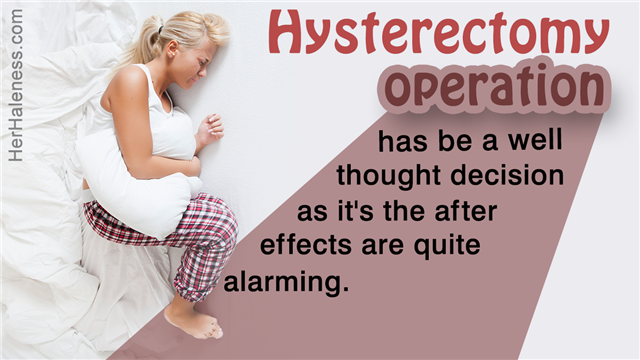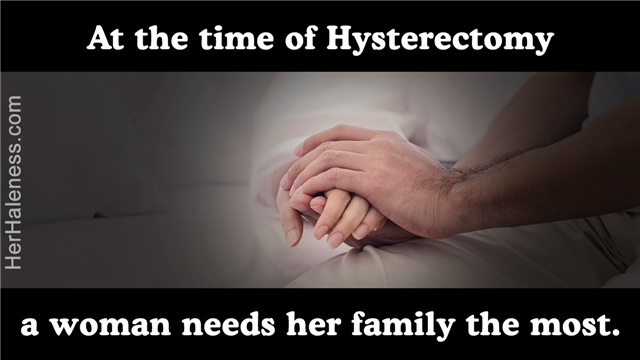
If you are curious to know about the side effects of hysterectomy then you have found yourself at the right place, this article explains the side effects and also how it can be dealt with.
What is Hysterectomy?
Hysterectomy is the surgical removal of a woman’s uterus.
Hysterectomies are not emergency operations. So, there is time to think and thinking is something that you should do before getting a hysterectomy done. Since it means the removal of a part which has an important function in the female body.
Therefore it is better to think of other options as well if removing the uterus is not the only option left because, after the surgery is done there are various side effects that can be observed. Here we will discuss some of those side effects.
Why does Hysterectomy Have an Impact on the Body?
Hysterectomy has side effects since it involves the removal of the uterus, which is associated with reproduction. The uterus is the part of the body that accommodates and provides nourishment to the fetus from conception till birth.
As the hysterectomy is done, a woman can no longer have children and menstruation also stops naturally, since the two are correlated. The ovaries that are not influenced to an extent continue to produce hormones, though at times their activity is reduced to a level.
Side Effects of Hysterectomy
Things That Determine The Side Effects of Hysterectomy
There are various factors on which depends how a person’s body would react to hysterectomy like the ones that follow:
- Whether the surgery was done after menopause
- Age
- Type of hysterectomy
In the hysterectomy that where the uterus is removed and the ovaries are still there, the body behaves the same as it would have when you had menstruation, but you will not bleed and to top it all there would be hormonal changes and you would have to face something like pre-menstrual symptoms.
Physical Side Effects
Direct Physical Side Effects of Hysterectomy
- Since uterus has got to do with the sexual behavior of a person, removal of the uterus might result in low sex drive.
- There can also be urinary problems.
- Vaginal Dryness.
- Heavy Bleeding.
- Early Menopause
- Painful sexual intercourse.
Indirect Physical Side Effects of Hysterectomy
- Women after hysterectomy are fatigued more often than before.
- They suffer from headaches.
- The tendency to gain weight is one of the hysterectomy side effects.
- One might suffer from hair loss and hot flashes.
- Women become prone to heart diseases and osteoporosis.
- They might complain of pain in the joints.
- Don’t be surprised if she fails to remember a few things since these people do suffer from memory lapses.
- This can be true for some women and it is just the opposite for other women.
Emotional After Effects
Positive After Effects of a Hysterectomy
It has been observed in the survey done by various health organizations around the world that most women after hysterectomy feel free and increased responsiveness. the fact of not never bleeding again and never being scared of pregnancy is accepted happily by many people. The positive reactions depend a lot on the woman’s knowledge about the procedure and the after effects and also about the reaction of the people related to the woman.
Negitive After Effects of a Hysterectomy
Take this as a fact and not an assumption that hysterectomy actually affects the self-esteem of some women who feel that they have lost an important ability and a privilege. They feel and react very strongly and go through a depressive phase. Only the partner and the family can help her out in this phase. So, try to help and do not worry. Women do come out of this phase with a little encouragement and appreciation.
Types of Hysterectomy
Firstly, make sure you go to an experienced gynecologist if a hysterectomy is necessary. The doctor will help you in deciding the appropriate type of hysterectomy. There is partial hysterectomy, where only the uterus is removed. In total hysterectomy both the uterus and cervix are removed. There is radical hysterectomy where the upper part of the vagina, tissue on both sides of cervix and uterus are removed. However, radical hysterectomy is only performed if the patient has cancer.
It is essential that when mothers or wives or sisters go through this phase, other members of the family show a certain level of sensitivity that is required to take the patient out of the trauma of losing an essential body part. It is the same depression that a person might go through after losing a hand or leg. Believe it or not! This is true and not an exaggeration. Proper care and attention will help the woman to deal with the after-effects and live a happy and healthy life.
Disclaimer: This article is for informative purposes only, and should not be used as a replacement for expert medical advice.


